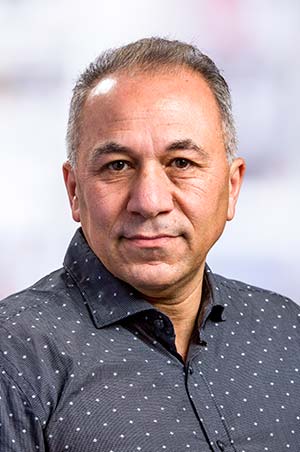Soheil Meshinchi, MD, PhD
Professor
Translational Science and Therapeutics Division, Fred Hutch
Dr. Soheil Meshinchi is an expert in leukemia biology, peripheral blood stem cell transplantation for children with leukemia, management of post-transplant relapse and targeted therapies for acute myeloid leukemia patients. He provides scientific leadership for many national and international committees and cooperative research efforts. He has a wealth of expertise in genomic profiling and determining the prognostic value of specific molecular alterations in AML and has developed numerous clinical assays that have been implemented in cooperative group trials. Dr. Meshinchi serves as director of the largest genome and transcriptome sequencing project in pediatric and young adult AML and has created a robust biorepository of viable cells, plasma and extracted nucleic acids from over 100,000 specimens from 3,000 patients. He has also fostered a consortium of computational and laboratory scientists to interrogate genomic data generated from these samples in order to guide the development of novel biomarkers and therapeutics.
Other Appointments & Affiliations
Professor, Division of Pediatric Hematology/Oncology, University of WashingtonProfessor, Division of Pediatric Hematology/Oncology
University of Washington
Attending Physician, Pediatric Hematology Oncology Specialist
Seattle Children's Hospital
Attending Physician, Pediatric Hematology Oncology Specialist
Fred Hutchinson Cancer Center
Chair
COG Myeloid Disease Biology Committee
Vice Chair
COG Myeloid Disease Committee
Director
COG AML Cell and Nucleic Acid Repository
Director
COG Hematopoietic Integrated Translational Science Center (HM-ITCS)
Education
Research Associate: Fred Hutchinson Cancer Center, 2000- 2002
Fellowship Training, Pediatric Hematology and Oncology, University of Washington, 2000
Fellowship Training, Pediatric Hematology and Oncology, Fred Hutchinson Cancer Center, 2000
Residency Training, Pediatrics, Johns Hopkins Hospitals, 1997
MD, Wayne State University, 1994
PhD, Pharmacology/Protein Biochemistry, University of Michigan, 1990
BS, Microbiology, University of Michigan, 1984
Research Interests
Dr. Meshinchi’s laboratory is focused on the identification and functional evaluation of molecular alterations in leukemias, in order to advance novel “biomarkers” for clinical risk assessment and to be used as therapeutic targets. He is recognized worldwide as an expert in large-scale studies of the many genes (the genome), “RNA” molecules that are made from genes (the transcriptome), and small chemical changes that can substantially change gene, RNA and protein activities (the epigenome) to promote leukemia formation and progression.
Current Projects
In close collaboration with COG and Southwest Oncology Group (SWOG) Myeloid Disease Committees, Meshinchi and colleagues use pediatric and adult patient biospecimens from multi-institutional trials to define potential biomarkers of disease state and/or therapeutic sensitivity and test their real-world utility in clinical trials. They have shown that persistence small numbers of “residual” leukemic cells carrying leukemia-associated aberrations after initial therapy (minimal residual disease; MRD) is highly associated with eventual relapse. This early and sensitive method of detection of persistent disease can help identify those destined for eventual relapse and augment their therapy to improve outcome.
The Meshinchi team also uses robotic high-throughput profiling to screen well-annotated patient specimens of sensitivities to hundreds of novel therapeutics to identify agents that may have efficacy in patients with specific genomic profile. In considering genomic alterations in AML, they clarified the prevalence and clinical significance of mutations in the FLT3 gene and other, related “receptor tyrosine kinases” (RTKs) that have recently been implicated by the Meshinchi group and others. Dr. Meshinchi showed that FLT3 activating mutations are associated with particularly aggressive cases of pediatric AML. Drug inhibitors of FLT3 and certain other RTKs are being tested in the clinic.
